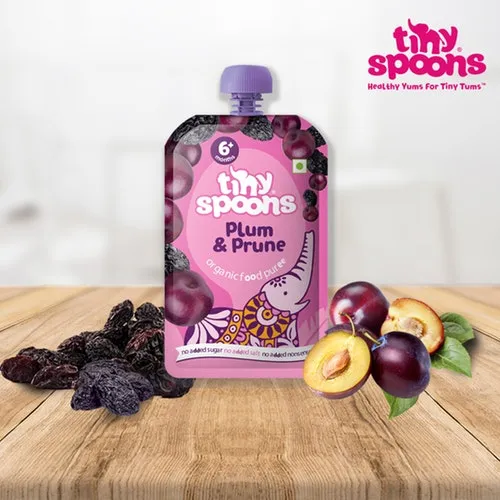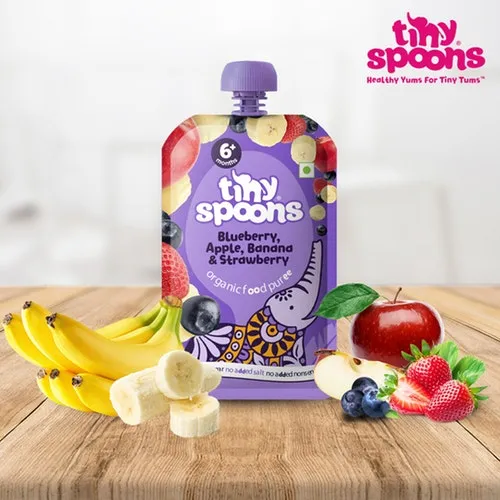Why this CA quit his job in London to start an organic baby food brand in Mumbai
Dharmesh Ratanghayran's brand Tiny Spoons sources fruits and vegetables from Italy and Spain, processes and packages them in Europe, and sells in India. Here's how the business model works.
When chartered accountant Dharmesh Ratanghayra and his wife Manisha Sharma worked in London, they fed their baby organic fruit and vegetable purees.
The market for organic baby food, especially fruit and vegetable purees, was well-established in Europe. It was as simple as picking up some tasty fruit puree from the local supermarket.
But on their visits to India, Dharmesh and Manisha found it difficult to source the same organic fruit purees.
“I realised there was a lack of nutritional, healthy, affordable, and organic choices for babies in India,” Dharmesh tells SMBStory.
Organic food in India is often not certified like it is in Europe, and further, it is expensive. Also, local farmers may not have the existing capability to manufacture high quality organic fruits and vegetables without using any pesticides, chemicals, or harmful fertilisers.
These were just some of the many reasons Dharmesh identified for the lack of organic fruit purees in India.

Dharmesh Ratanghayra, Founder, Tiny Spoons
“I always wanted to be an entrepreneur and I started to think about how I could bridge this gap for organic baby food in India,” he says.
Despite the challenges he identified, Dharmesh wanted to start an organic food puree brand in India.
In 2016, he quit his cushy job as Finance Director at a London tech startup, and started to develop his organic baby food idea.
A unique model
After visits to organic farms in Spain, Italy, Austria, and Slovenia, Dharmesh came up with a solution to avoid the challenges of making organic baby food in India. He decided to manufacture the products in Europe and sell in India.
In 2018, Dharmesh invested Rs 40 lakh from his personal savings to start organic baby food brand ‘Tiny Spoons’ in Mumbai.
Dharmesh planned to source the fruits and vegetables from farms in Italy and Spain, and also do the processing and packaging in Europe too. The final product would be imported and sold in India.
The idea was ambitious, at the least, but Dharmesh was determined to make it happen.

Tiny Spoons' plum and prune puree
However, starting up in Mumbai meant his family had to move back to India.
“My wife was supportive of this, when we moved back to India, she continued working,” he says. Dharmesh then raised a round of seed funding from friends and family.
Tiny Spoons thus began selling its EU-certified, organic, ready-to-eat fruit and vegetable purees in June 2018. The company also claims that its purees have no additional and harmful preservatives.
Tiny Spoons’ purees made from plums and prunes, and blueberries, apples, bananas and strawberries cost Rs 160 for a packet of 120 grams.
Dharmesh explains the pricing, saying:
“We want to focus on the mass premium segment in the top few cities in India such as Delhi, Mumbai, Bengaluru, Chennai and Hyderabad. Right now the packet costs Rs 160, but we are working to bring the cost of our products down to Rs 100.”
He also says that the organic baby food products quickly became a success, while adding that he does not wish to disclose company financials.
“Our fruit purees are now available at Mothercare, Godrej Nature’s Basket, Food Hall, Namdharis, Le Marche, MK Retail, other premium retail stores, and also Mumbai duty-free,” he says.
The products are also available on Amazon India, FirstCry, Big Basket, Snapdeal, Flipkart, etc. “We have a high sticky rate based on our online customer data. This shows that parents and kids love Tiny Spoons and trust us to provide only the best. Our cohort shows an increase in online and offline customer base, which is encouraging,” he adds.
Looking ahead
At the moment, there might be no immediate competition, but the brand aims to continue using the best ingredients and processes, and also launch new products.
“For instance, our purees are pasteurised, and not sterilised like other brands. Further, we use high quality and safe packaging,” Dharmesh says.

Tiny Spoons' blueberry, apple, banana and strawberry puree
Manufacturing in Europe does come with its fair share of challenges. Dharmesh says it is difficult for an Indian food brand to source ingredients from European food producers.
“Generally, India exports its food products and ingredients to countries in Europe. But our model is the opposite. Therefore, it is hard to gain the trust of our European partners who may think there is something fishy going on with the business model,” he explains.
While slowly gaining their trust and making more contacts, Dharmesh is also looking at making in India.
In the near future, Tiny Spoons aims to make new food products in India and penetrate further into the metro markets. However, the purees will continue to be made in Europe.
In July 2019, Tiny Spoons raised Rs 2 crore from angel investors including Anil Joshi, Managing Partner of Unicorn India Ventures; Paresh Kariya, an early-stage investor in Naaptol; Drums International HNI investor Harsha Vijay; Vivek Shah, Managing Director, IB, at Haitong Securities, and others.
“We are focussing on growing our product catalogue and strengthening distribution. We think there is immense scope for us to do better and provide Indian kids with food made from the best and healthy farm produce,” Dharmesh says.



1551791705233.png?fm=png&auto=format&h=100&w=100&crop=entropy&fit=crop)





